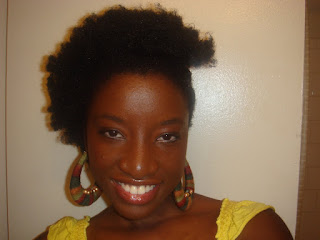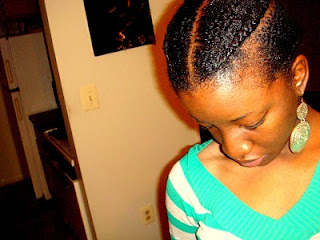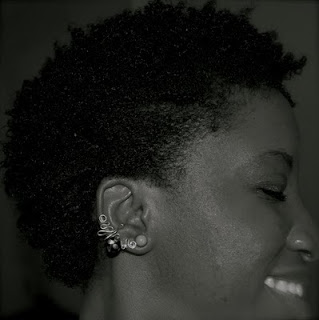DB: How long have you been natural?
Ada: My last relaxer was in April of last year. So I've been natural for roughly a year.
DB: What do you think is the best thing about being natural?
Ada: Oh my. The list is endless. My hair has character, it does its own thing; very unpredictable. My hair breathes...lol! But really, just the fact that I don't have to hide under anything. I do not have to go to extreme lengths to fit a certain mold. I can achieve a bunch of styles with my hair. I can morph into an afro, make it coily, curly or blow out in your face or just plain straight. What is there not to love? Oh and of course I do not have to run away from water!
DB: What is your hair care regimen?
Ada: I wash and condition my hair once a week. I usually mix olive oil and coconut oil into my conditioner. I deep condition twice a month with either Aubrey Organics Island Natural Conditioner
DB: How do you maintain moisture?
Ada: I maintain moisture by sealing my ends with a heavy butter and oil after washing and conditioning. During the week I'll mist my hair as needed.
DB: Any words of wisdom that you'd like to share with transitioners or newly naturals?
Ada: Trasitioners, look for styles that require little to no manipulation because it can get frustrating especially when you start getting a lot of new growth. Also look to do styles that blend in with your hair texture. When I transitioned I wore my hair in straw sets or I'd attach a faux afro puff. I transitioned for six months and BC'd because I just couldn't go any further. My hair was a tangled mess. Do not be afraid to do a BC.
To new naturals, I'll advise to be patient. At that stage you probably are looking for what works for you in terms of products and styles. When you do find what works, trust it will be a breeze from then on. Don't get caught up trying to get your hair to do what it can not do *cough* curl definition *cough*. You have to get to a point where you love your hair with all its hang ups or it will just be a frustrating journey. Please don't be too eager to try the next flaming product. If you find what works for you, stick to it (I need to take my own advice, lol).
DB: Is there anything else you'd like to add?
Ada: That's pretty much it! Feel free to check out my YouTube page. I do cover songs and will be putting up my own originals when graduate school lets me, lol.







